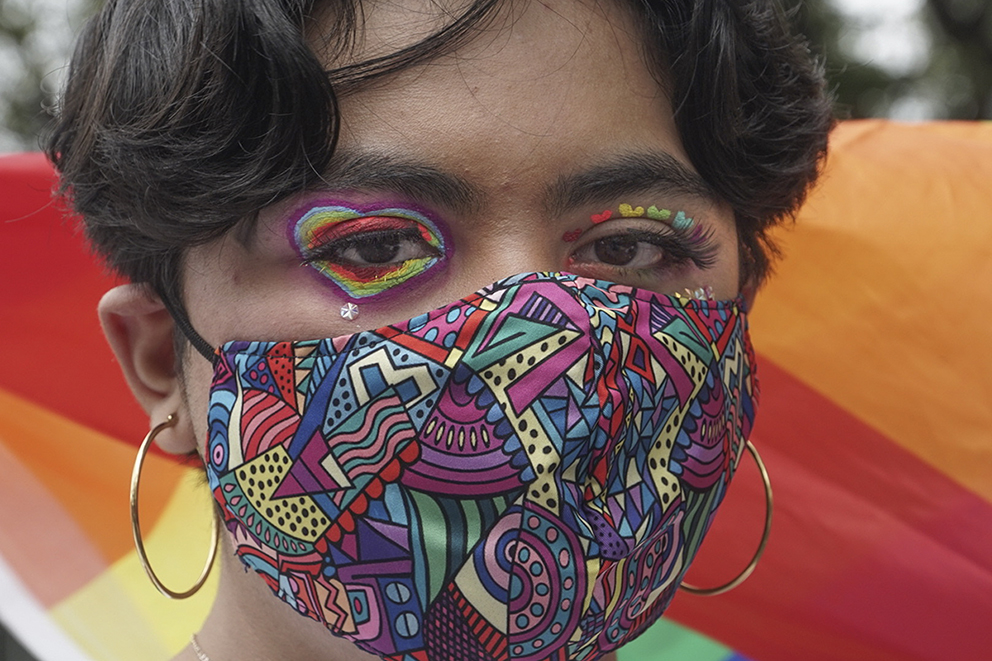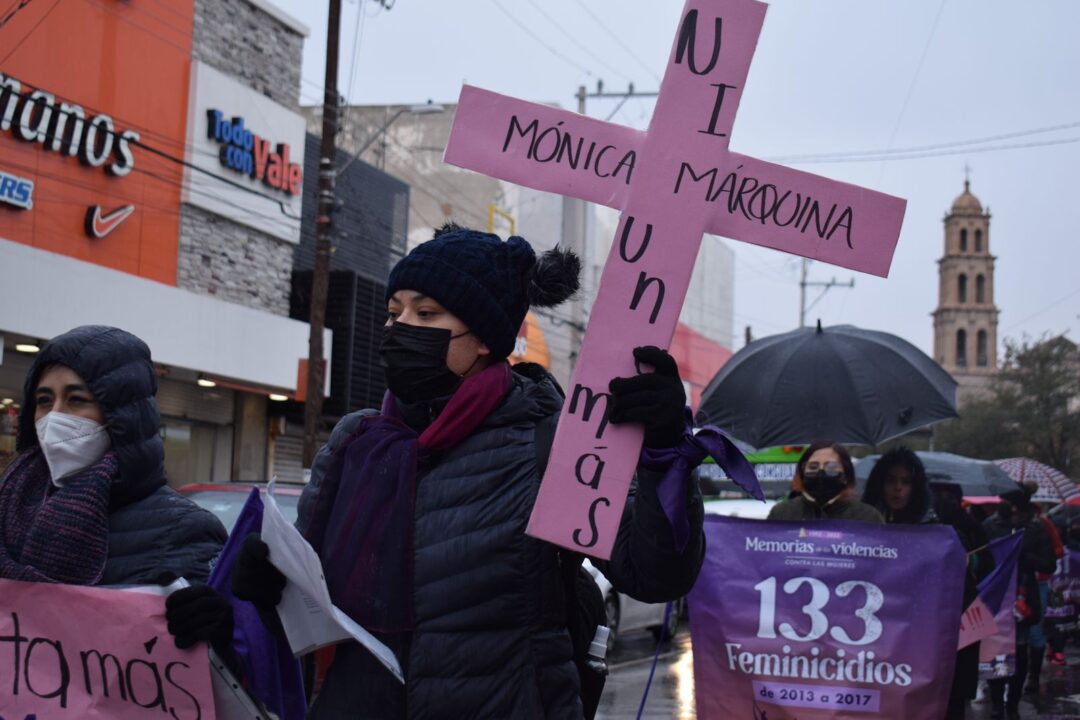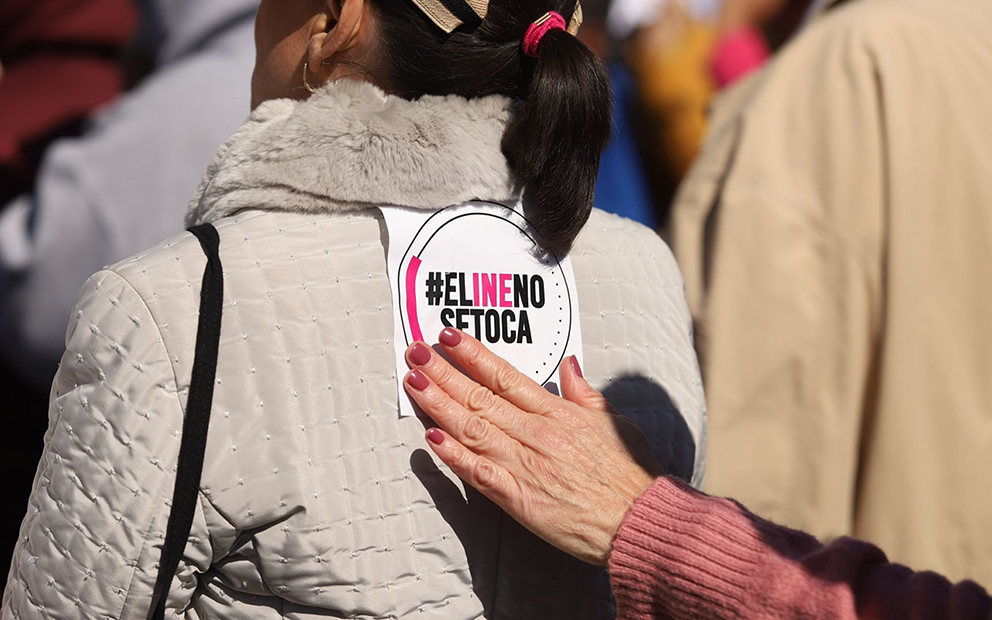The end of the year serves to remind us of the successes after decades of struggle; to celebrate and study them. It’s also a good time to reflect on the fact that, in Mexico, there’s still a long road ahead to guarantee autonomy and rights for all
Text by Alejandro Ruiz, originally published December 30, 2021.
Photo by Isabel Briseño.
Translated by Elysse DaVega for Pie de Página in English.
SAN LUIS POTOSÍ– 2021 was not an easy year. There are still more rights to be fought for and won; and working towards the prevention of violence and impunity comes before all else. For feminist and LGBTIQ+ movements in Mexico, 2021 brought several victories that ought to be celebrated.
The legalization of same-sex marriage and the decriminalization of abortion in some states are good examples. Although there’s more on the agenda, women are leading steady progress on one of the fronts against the patriarchy and discrimination: human rights.
The ‘green tide’ expands
This year, four states in Mexico decriminalized abortion. Hidalgo, Veracruz, Baja California and Colima all amended their penal codes in 2021. Still, there are only six states in total that have made these kinds of amendments.
Everything started in Mexico City in 2007, when the local legislature decriminalized abortion in the nation’s capital. This wasn’t by chance; it was the product of many years of feminist struggle to influence public policy.
In 2009, two years after this historic feat, the passing of official regulation NOM-046, which established preventive measures for violence against women, allowed medical abortions in cases of rape nationwide. However, in many states, this hasn’t amounted to much: authorities and medical personnel refused to carry out the procedure, and, in some cases, even arrested women who sought to exercise this right.
It took ten years for another state to legislate in favor of women’s right to choose. Such is the case of Oaxaca, where the state legislature decriminalized abortion in 2019.

In 2019, México City and Oaxaca were the only two states that had decriminalized abortion. By 2021, four more states joined the movement. RThe Supreme Court’s declaration regarding the case of Colima opened doors for other states to be able to make legal progress on the issue.
Perhaps the motives for this progress were the widespread protests led by women of all ages for the last couple of years. However, some of these women were arrested, as took place in the states of Querétaro and Quintana Roo.
There is every indication that women will return to the streets again in 2022 to demand their sexual and reproductive rights, as well as an end to patriarchal violence that devastates them day after day.
State legislatures will have no choice but to fulfill their promises and listen to the voices of the women fighting for their rights.
As of now, 26 states haven’t joined the ‘green tide’; but they are expected to soon. The reality of this decision, however, will depend on the streets.
Mexico’s pink-washing
In 2015, the Supreme Court issued a ruling in which they declared civil codes prohibiting same-sex marriage unconstitutional.
The court’s verdict was the product of a fight that LGBTIQ+ activists have fought for decades: the recognition of same-sex marriage.
The legal process began in 2009. That year, the nation’s capital legalized same-sex marriage. However, a year later, conservative groups campaigned against the ruling. The court ruled in favor of the LGBTIQ+ community and declared every law blocking same-sex union unconstitutional.
Like a giant wave, between 2014 and 2020, following appeals made by thousands of LGBTIQ+ activists, 18 more states have followed in the capital’s footsteps and legalized same-sex marriage.
In 2021 alone the list grew to 25 states, among them three of the most conservative states in the country: Zacatecas, Guanajuato and Querétaro. The latter two, however, resisted adopting the new law. In Guanajuato, the Catholic church spoke out against the decision to allow same-sex marriage.
Despite this, in September of 2021, after Sonora joined the list of states to legalize this right, activist Alex Méndez pointed out that although the LGBTIQ+ community has won this fight, there’s still more to be done.
«To the legislatures’ credit, one way or another, they finally understood that this was something that needed to happen.»
Alex Méndez
Upcoming issues that activists have emphasized are the right for trans youth to legally change their name, more attention from medical personnel to prevent HIV and AIDS, the prevention of homophobic hate crimes, and more.
Even if legislative progress may give the appearance of change in Mexico, it’s still not the reality. Mexico, unfortunately, is still a profoundly sexist, homophobic, and transphobic country. This won’t change through legislation alone.
Alejandro Ruíz is an independent journalist based in the city of Querétaro. He believes in the stories that llow us to open spaces of reflection, discussion and collective reation, and is convinced that other worlds are possible if we build them from below.
Isabel Briceño has never liked the fact that happy stories come to an end, which is why she captures them on camera; she captures sad stories in a search for answers.
Click here to sign up for Pie de Página’s bi-weekly English newsletter.
Ayúdanos a sostener un periodismo ético y responsable, que sirva para construir mejores sociedades. Patrocina una historia y forma parte de nuestra comunidad.
Dona


















